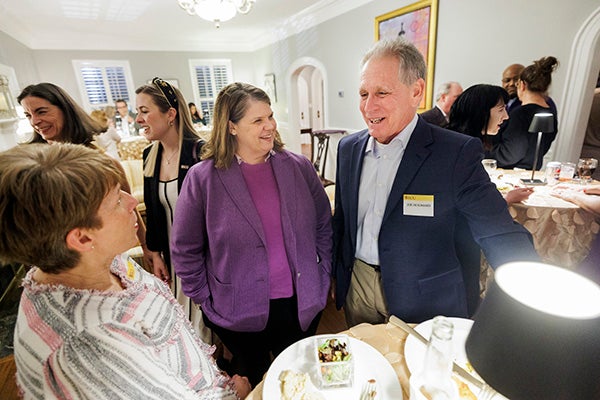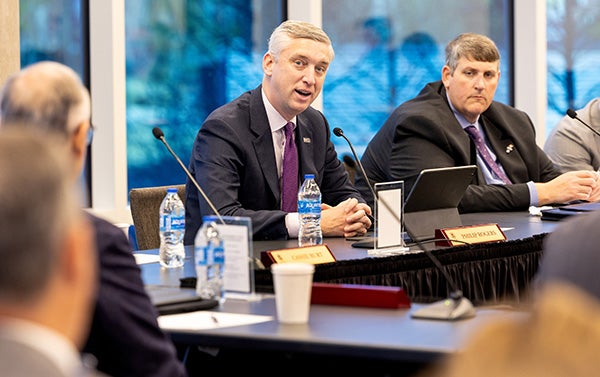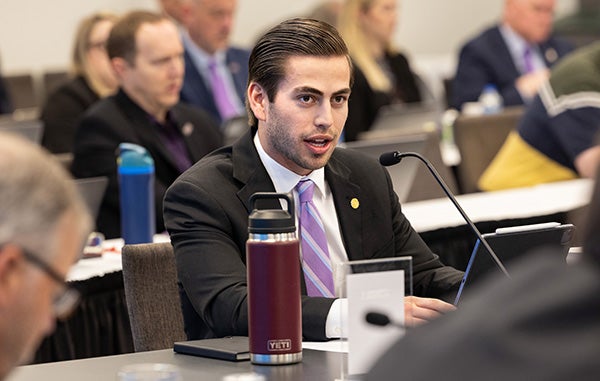Board of Trustees hears research highlights
With a 127% increase in research funding since 2018, East Carolina University is making a positive difference in the lives of students and people throughout the region, nation and world.

Dr. Sharon Paynter, center, chief innovation and engagement officer, speaks with Dr. Joseph Houmard, right, a professor in the Department of Kinesiology, during a research celebration event Thursday in the Dail House. (Photo by Steven Mantilla)
The Board of Trustees heard that message from Chancellor Philip Rogers during its regular meeting on Friday in the Main Campus Student Center.
“As I’ve often mentioned, ECU’s success in the research space is quite simply a derivative of our university doing what we do best — which is to unapologetically deliver on our mission and vision as established in our strategic plan Future Focused – Innovation Driven,” Rogers told trustees. “In practice, this means that ECU researchers and innovators enhance economic development opportunities, improve health care outcomes, develop new technologies, and give life to entrepreneurial ventures, among so much more. And the tangible outcomes demonstrated through these efforts leave no doubt that our academic brand is on the rise.”
Rogers specifically noted projects on oral health care access in underserved areas, blood clot formation and treatment methods, melanoma therapeutics, energy resilience in coastal communities, and military readiness and sustainability.
The night before, Rogers, Dr. Sharon Paynter, chief innovation and engagement officer, and the Board of Trustees hosted a celebration at the Dail House for ECU researchers who had secured at least $1 million in grant funding per year from 2021 to 2023.

Chancellor Philip Rogers speaks during the Board of Trustees meeting on Friday. (Photo by Rhett Butler)
Paynter noted that when she arrived at ECU in 2009, the university’s research expenditures totaled $24.1 million but exceeded $70 million last year. She thanked those involved in developing ideas, submitting proposals, financial management, reporting, compliance and supporting “the anchors of our research engine — faculty, staff and students.”
“These faculty are responsible for the awards that become cancer drugs, new ways to harvest ocean energy, innovate approaches to business support, and so much more,” Paynter said. “They train teachers, nurses, dentists, and physicians and explore interventions to address challenges impacting communities and residents across eastern North Carolina and the rest of our state.”
During Friday’s session, SGA president Anderson Ward and trustee Vince Smith made a special note to thank Dr. Lynn M. Roeder, who will be retiring as associate vice chancellor and dean of students. She’s worked at ECU since 1993.
Ward called her “a light to not only myself and my entire family for many years, but the entire East Carolina University community.” Smith described Roeder as a “great, wonderful superstar for this university, and most importantly, the students.” A standing ovation for Roeder followed their remarks.
In actions Friday, the board:
- approved a measure to allow planning to begin to have the ECU Water Resources Center become a University of North Carolina System center. Since it was established in the Thomas Harriot College of Arts and Sciences in 2018, the center has developed a community of more than 50 faculty and staff affiliates who have secured and supported more than $20 million in external funding for water research and education. As a UNC System center, it would provide more opportunities for ECU students, faculty and staff to make meaningful impacts on the understanding of water issues and to develop more sustainable water management.
- approved a non-salary compensation plan that rewards academic and competitive success for coaches and support staff within athletics. Jon Gilbert, director of athletics, said the bonuses are for meeting competitive benchmarks, academic progress rate benchmarks and academic benchmarks as determined by the American Athletic Conference.
- approved a 12-acre parcel on B’s Barbeque Road gifted by ECU Health to be used for the construction of a new regional medical examiner’s building. Additionally, ECU Health gifted a second piece of property on MacGregor Downs Drive for the construction of an outpatient behavioral health center. It would require approval by the UNC Board of Governors.
- approved millennial campus designation for the North Recreational Complex as well as the Department of People Operations, Success and Opportunity training center at 119 Cotanche St. This action requires approval by the UNC Board of Governors.
- approved naming of the Student Veterans Lounge in the Main Campus Student Center for Bill and Nancy Miller; the Honors College conference room in honor of Kay Chalk; the visiting bullpen at Clark-LeClair Stadium and entrance to the track for Ryan Colich; the field at Johnson Stadium and south concourse at Dowdy-Ficklen Stadium for Bill Clark Homes; and the home bullpen at Clark-LeClair Stadium for Derek Dunn.
- approved issuing of special obligations bonds for renovations to Legacy and Jones residence halls. The renovations at Legacy, which are scheduled first, include replacement of all plumbing, mechanical and electrical systems, which are original to the building built in 1960. Bathroom renovations will include private baths, while radiators will be replaced with window-mounted heat pumps. An elevator will be added as well as new ground-level entry at the front of the building to further comply with the Americans with Disabilities Act.
In Thursday’s committee meetings:
The Committee on Strategy and Innovation and the University Affairs Committee met jointly to learn more about the university’s strategies for enrolling new students in three key markets: freshmen, out-of-state and transfers.
Data show that students’ top factors in choosing a school are cost, academic degree programs and campus life — all areas that ECU rates higher than its top in-state competitors.
ECU offers academic programs that students are interested in, and data show 61% of admitted students intend to pursue either nursing, biology, psychology, engineering, marketing, computer science, exercise physiology or criminal justice. A 2019 survey found that if prospective students visited campus, they were 28% more likely to come to ECU. Once they enroll, helping students get involved in organizations and extracurricular activities increases retention.
Areas of opportunity to increase enrollment include continuing to target engagement with students most likely to enroll; programs held on and off campus, like Pirates in Your Town and Let’s Connect events; partnerships and transfer agreements with community colleges and online degree completion programs.

Anderson Ward, SGA president, speaks during the Board of Trustees meeting on Friday. (Photo by Rhett Butler)
The Audit, Risk Management, Compliance and Ethics Committee heard an update on work to develop standard operating procedures for advising throughout the university. Described as a “universal syllabus for advising,” the plan is designed to develop a consistent student experience from orientation and class registration to declaration of majors and application for graduation. The goal is for the plan to be completed by the end of the year.
During the Athletics and Advancement committee, Gilbert said ECU is working with Deloitte, a consulting firm, to develop a revenue sharing plan based on the expected House v. NCAA court settlement. He hopes to have an idea on ECU’s direction in March.
He also mentioned that ECU’s single-year academic progress rate was 991 of 1,000, the university’s highest number since the COVID-19 pandemic. He said that number qualifies for NCAA academic distribution. Gilbert also shared that the Pirate Club had raised $80 million in the last three years, with 125 donors making major gifts of $25,000 or more.
Vice Chancellor for Advancement Christopher Dyba reported that fundraising in support of the Chancellor’s Scholars Initiative created 75 new scholarships, which have been offered for fall 2025. The four-year renewable scholarships of $2,500 are meant to recruit and retain high-achieving students.
Dyba also shared that Pirate Nation Gives will take place on March 5. This marks the ninth year for ECU’s day of giving. The goal is to exceed last year’s $8.5 million in donations and engage more than 3,000 individual donors.